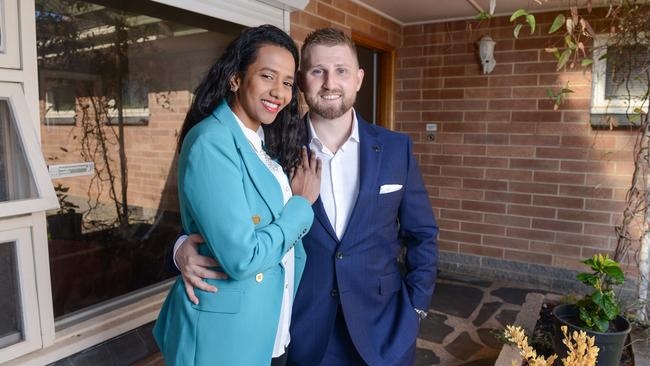Interest rates are up – but what effect will the long term sting have on your spending?
From pub meals to movies, we break down the surprising spending that adds up to the average $4000 a year homebuyers will need to find.
SA Business
Don't miss out on the headlines from SA Business. Followed categories will be added to My News.
South Australians are set for hip pocket pain, with the Reserve Bank of Australia hiking interest rates by half a percentage point to 1.35 per cent – the third rise in as many months.
Inflation has surged to a multi-decade high of 5.1 per cent over the year, supercharged by a massive increase in fuel costs and compounded by an east coast power crisis alongside devastating floods, which have exacerbated a spike in food prices.
Founder and director of MyBudget Tammy Barton said the company had seen a spike in interest in budgeting services as Australians feel the cost-of-living pinch.
Ms Barton said now was the time for people to look at their spending and understand where their money was going – particularly when it came to non-essentials.
While buying lunch every day or cracking out the card for a gym membership may not seem like much week to week, Ms Barton said it was important to remember that every little bit adds up.
“If you spend on non-essentials like pay TV, entertainment and eating out and Uber Eats, you could either cut back completely, or find more affordable options,” she said.
Based on SA’s average loan size of $459,262, a $1934 per month mortgage repayment will go to $2257 per month, a monthly increase of $323.
This adds up to a yearly increase of $3,826.
So what does that number look like in everyday items? We crunched the numbers.
What could you sacrifice for $3876 in a year?
- Uber Eats for a family of 4 once per fortnight – $2,600
- F45 Membership – $3,380
- Movie tickets and snacks once per fortnight – $2,132
- One term of Catholic schooling (average) – $2,324
- six months private health insurance (average per person) – $2,757.3
- 1ct diamond engagement ring – $3,046
- 1x carton beer and 8 bottles of wine per month – $2,064
- Buying lunch Monday-Friday ($13 per day) – $3,380
- Pub dinner for two (schnitzel and a pint) once per week – $3,640
- Phuket getaway – 2 adults for 5 nights – $3,157
- Fiji getaway – 2 adults, 2 kids for 7 nights – $3,390
- Early bird parking in the CBD Monday-Friday – $4,940
- Mani-pedi and eyebrow wax and tint once per month – $1,500
For those not willing to cut down on the pub dinners, Ms Barton said there were other alternatives to stem your spending.
Households can potentially save $1000 a month by checking all their bills, switching to cheaper alternatives, and starting some new cost-saving habits.
Read more: 10 ways to slice $1000 a month off bills
“It’s your lifestyle, so you don’t need to deprive yourself of every bit of fun, but even cutting back a little bit here and there can make a difference,” she said.
“It’s really a matter of weighing up what is really important to you.”
Consolidating debt can make money management easier and help with budgeting, or even help buyers negotiate a lower rate or switch to a better deal.
“Having multiple debts, such as credit card debt, personal loans and a home loan could mean you’re paying more in interest rates and fees than you have to, because you’re paying to different providers,” Ms Barton said.
Ms Barton said shopping around for bill and insurance providers could also help save hundreds when it came to crunch time, as well as reassessing extras and levels of insurance.
“There are plenty of product and service comparison sites available online which can help you make an informed decision that suits your lifestyle and your budget,” she said.

Off-setting hikes to ease pain
By Jagmeeta Joy
With the RBA hiking rates, mortgage repayments will take up an even larger chunk of household budgets which are already stretched.
Damian Bastiras and his wife Durga who recently bought their home in Albert Park have now put renovation plans on hold.
“We are going to see how the rate rises go in the future before we start work on the renovations,” Mr Bastiras said.
“When we bought our home, we were conscious of the fact that interest rates could rise and set in place an offset account and that’s something I would strongly advise everyone looking to ride out the interest rate rises,” Mr Bastiras said.
“We would be looking to make cutbacks on the non-essentials in our household budget. For one, we are definitely not going to be eating out or heading out for coffee as often as we would like to.”




